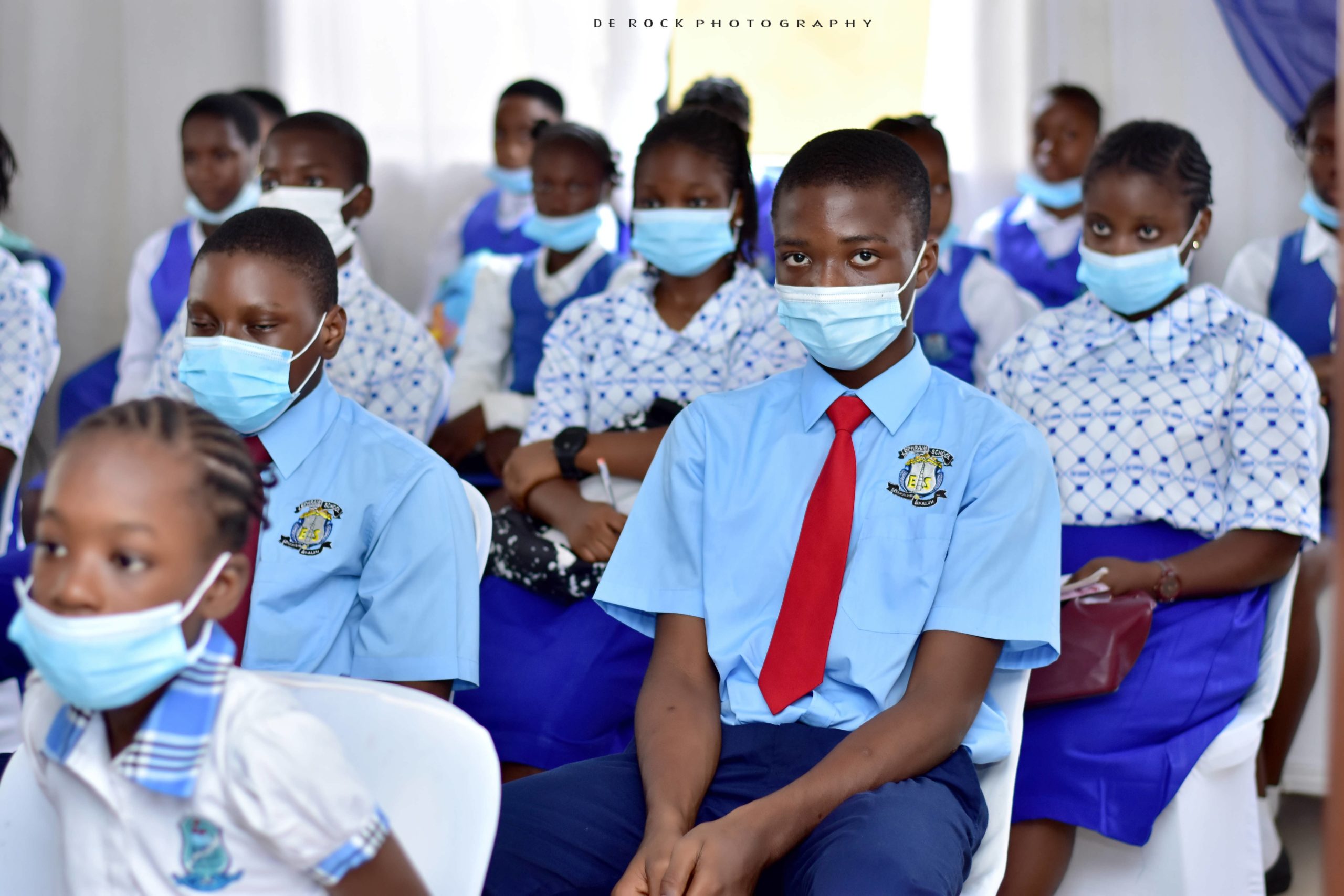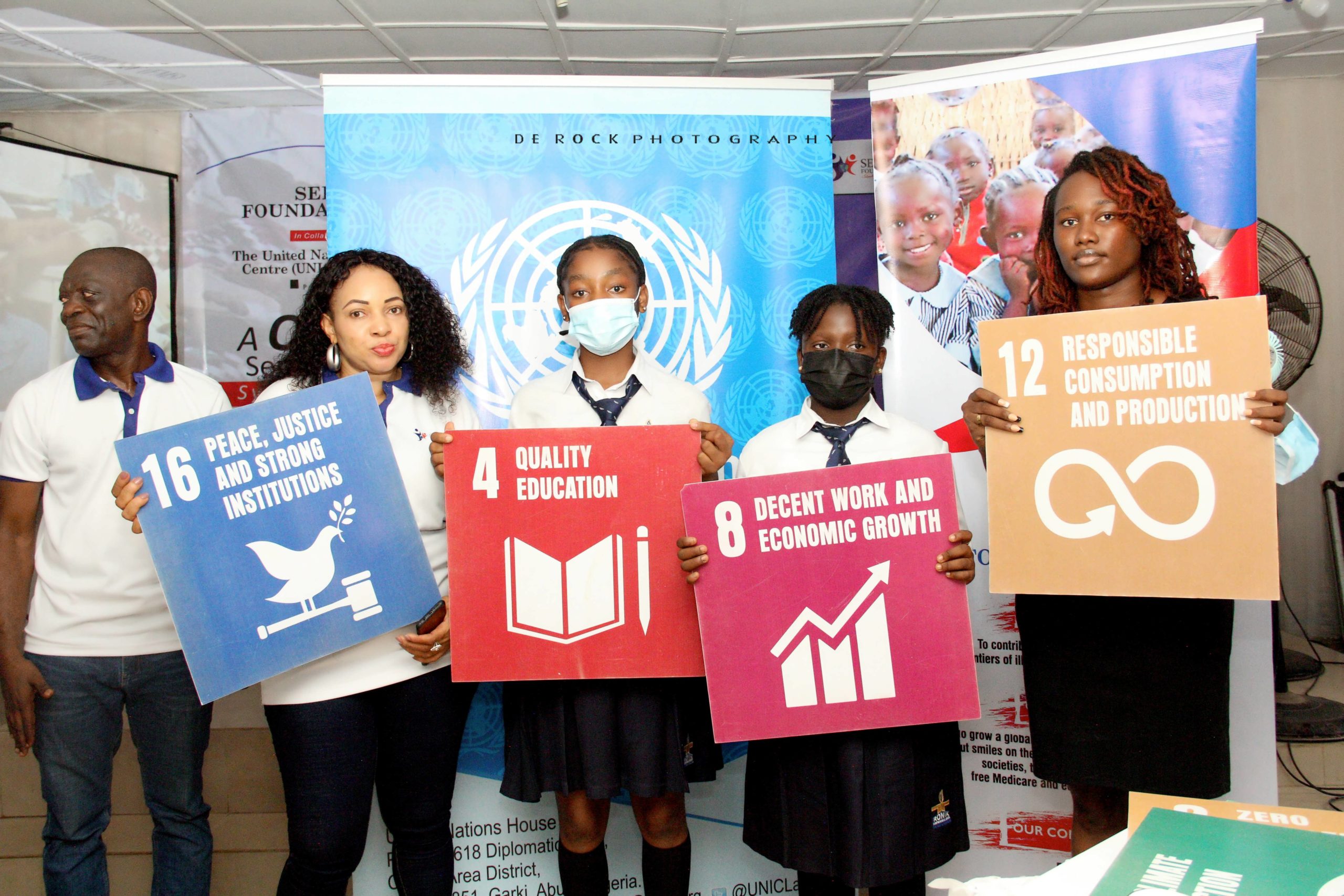Primary and secondary pupils within Isolo, Lagos State, and in Nigeria, in general, have been urged to embrace non-violent Communication in their

From left, Pastor Prosper Kanayo, founder of SeeJoy Foundation, Dr Bola Adewara, editor of E-life and Mrs Esther Kalu, convener of the symposium.
Primary and secondary pupils within Isolo, Lagos State, and in Nigeria, in general, have been urged to embrace non-violent Communication in their daily life to build a peaceful environment that would guarantee a great future for them.
In a one-day program put together by See-Joy Foundation International at Isolo Local Council Development Area (LCDA) of Lagos state, children were made to see the dangers involved in poor communications leading to violence and hazards in our society.
The workshop was chaired by Mr. Donald Kayanja, director, United Nation Information Centre, ably represented by Mrs. Bolanle Olumeko, Knowledge Management Assistant of the global Agency, Mr. Femi Abegunde, a peak performance coach, life strategist, emotion Freedom Technique practitioner, Mrs Yewande Adelekea teacher, coach and lead consultant at Prews Consulting Services, Mr. Agu Imo, a lawyer and solicitor and Mr Solomon Gbadebo, a seasoned development communicator, journalist, author, and pastor.
The participating schools include Apex Brilliant Academy, Bucknor-Isolo, Lagos State, Ephraim School, Oke- Afa, Isolo, Lagos State, Earth Impact College, Igando, Lagos State, Earth Project Impact Schools, Ire-Akari Isolo, Lagos State, and Amazing Grace Private Secondary School, Ire-Akari Isolo, Lagos State.
Others were Holy Saviours College, Isolo, Lagos State, Blessed Foundation School. Ire-Akari, Isolo, Lagos State, Havilacrest Private School. Ajao-Estate, Isolo-Lagos, Oluwole Christ the King School, Ejigbo, Lagos State, Ronik Comprehensive School, Ejigbo, Lagos State and St. Monica Secondary School, Agoro-Isolo, Lagos State.
In her opening address to the gathering, Mrs. Esther Kalu, the conference convener, said SEE-JOY FOUNDATION INTL is an organization running with a vision of enhancing the socio-economic wellbeing of the indigent and distressed children, particularly in Nigeria and generally across the African Continent.
‘Recently,’ she said, ‘we have had the burden to educate and sensitize our children on the essence of Non-Violent Communication (NVC) in their various schools. Non-violent Communication in schools was borne out of the need to promote peace, love, and empathy among children. I could not help but notice that children are becoming increasingly impatient in their daily activities and relationship with others which in most cases turns to aggression. This generation demands a prompt response. I have noticed a lot of students of senior classes aggressively bullying the small kids to get their things done before others. Exposure to violence can alter the way children feel and behave. Children are not born violent, nor are they naturally immune to the effects of violence.
‘The focus of this programme is to strengthen their ability to inspire others positively and to contribute to a world where everyone’s needs are attended to compassionately without violence.
‘According to Dr. Bruce D. Perry, M.D., Ph.D., a leading expert on brain development and children in crisis, he identified six core strengths that children need to be humane.
‘The child without these strengths will be in greater danger of becoming violent and less able to cope with verbal or physical abuse. To help children develop these crucial strengths, we hope to offer teachers, parents, and children the tools to identify, design, and enhance these core strengths.
- ATTACHMENT: Being a friend is the capacity to form and maintain healthy emotional bonds with another person.
- SELF-REGULATION: Thinking before you Act Developing and maintaining the ability to notice and control primary urges such as hunger and sleep-as well as feelings of frustration, anger, and fear-is a life-long process.
- AFFILIATION: Joining In The capacity to join others and contribute to a group springs from our ability to form attachments. Human beings are social creatures. We are biologically designed to live, play, grow, and work in groups

- AWARENESS: Thinking of Others Awareness is the ability to recognize the needs, interests, strengths, and values. The ability to be tuned, read, and respond to the needs of others, is an essential element of human Communication. An aware child learns about the needs and complexities of others by watching, listening, and forming relationships with a variety of children.
- TOLERANCE: Accepting Differences Tolerance is the capacity to understand and accept how others are different from you. This core strength builds upon another-awareness (once aware, what do you do with the differences you observe?).
- RESPECT: Respecting Yourself and Others Appreciating your self-worth and the value of others grows from the foundation of the preceding five strengths. An aware, tolerant child with good affiliation, attachment, and self-regulation strengths gains respect naturally.
During the programme, children staged a drama that showed how parents inadvertently train their children to be rude in school and violent in Communication.
In her speech, Mrs Olumeko, representing the Director of UNIC, said children should learn how to speak up by reporting to teachers or parents when they are being bullied by any seniors or mates in their schools or neighbourhood, adding that children should train themselves well in how to speak good English which would give them the confidence to speak out anywhere, anytime.
During the dialogue that saw panellists like Adeleke, Agu, Gbadebo, and Abegunde speaking on non-violent Communication, the panel critically looked at the homes where all lectures and examples began. Parents were warned to be careful in all they do because children learn by observing them.

COMMENTS